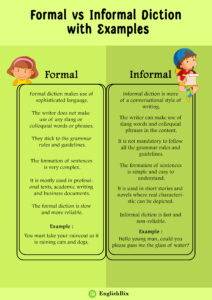Introduction: You could have observed that a writer or a speaker always has a set of word choices that effectively defines the writer’s style of expressing thoughts.
What Do You Mean By A Diction?
Basically, diction refers to the linguistic choice of the words that a writer makes to effectively convey or express his thoughts, with a specific point of view. These words used by the author can easily establish a distinctive style. It is very important to choose words for a specific purpose to become a strong writer.
Let’s explore the difference between formal and informal diction.
| Formal Diction | Informal Diction |
| Formal diction makes use of sophisticated language. | Informal diction is more of a conversational style of writing. |
| The writer does not make use of any slang or colloquial words or phrases. | The writer can make use of slang words and colloquial phrases in the content. |
| They stick to the grammar rules and guidelines. | It is not mandatory to follow all the grammar rules and guidelines. |
| The formation of sentences is very complex. | The formation of sentences is simple and easy to understand. |
| It is mostly used in professional texts, academic writing and business documents. | It is used in short stories and novels where real characteristic can be depicted. |
| The formal diction is slow and more reliable. | Informal diction is fast and non-reliable. |
For example:
- You must take your raincoat as it is raining cats and dogs.
Here in the sentence, they are trying to say that it is raining heavily and not literally cats and dogs. This is an informal diction example.
Formal diction example could be more like,
- Hello young man, could you please pass me the glass of water?
These six differences between formal and informal diction will help you in understanding the different styles of writing and communication that both of these follows. Keep Learning!


